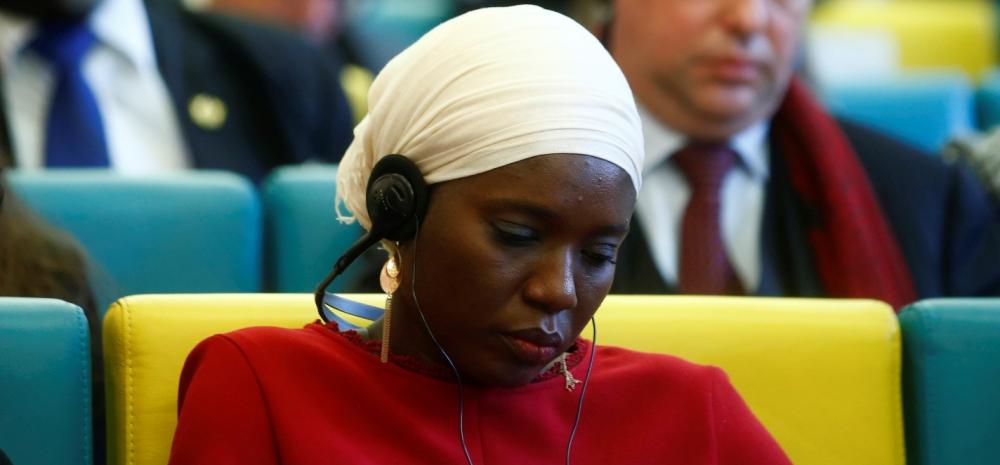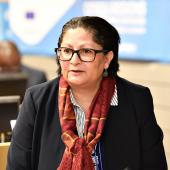
Casa África / Javier Barbancho on Flickr
Empowering human capital at a subnational level for sustainable and resilient development in Africa
The process of decentralisation in Africa is an irreversible process reinforced by a strong political will, several international, regional and national legal instruments—including constitutions—, and by diverse and multidimensional reforms.
Among these instruments, particular attention should be given to the African Charter on the Values and Principles of Decentralisation, Local Governance and Local Development adopted by the Heads of State and Government of the African Union at the Malabo Summit in Equatorial Guinea (2014), as well as SDG 11, which aims to ensure that cities and human settlements are inclusive, safe, resilient and sustainable.
These reforms can only be implemented, and the desired objectives can only be reached if, at the very foundations and on a ground level, we have political leaders and human resources in place that are committed, responsible, ethical, competent, professional, accountable, and aware of their duties towards the population.
Learning, training, peer learning and capacity building are crucial for decentralisation, local governance and local development.
That is why learning, training, peer learning and capacity building are crucial for decentralisation, local governance and local development. It cannot be achieved without some ingredients, including a long-term strategic vision, the identification and assessment of the concrete needs, the allocation of appropriate resources (human, financial, technical and logistical), adapted and customised methodologies and tools, dedicated training institutes, respect for standards of excellence and quality, win-win partnerships, exchange of knowledge and good practices, and much more.
For this reason, the United Cities and Local Governments of Africa (UCLG Africa) decided, in 2009, to create the African Local Governments Academy (ALGA) as a subsidiary body, with the main goal of investing in human capital and knowledge sharing at a local level throughout Africa.
With the slogan "Together for an Effective Local Africa”, ALGA’s objective is to invest in the most valuable resource in any local government, human capital, in order to promote and anchor professionalism and performance at local and regional levels. The Academy’s main goals are as follows:
- Strengthening the national associations of local authorities, their members, and human resources
- The promotion of accreditation and quality assurance for training institutes and programs
- Designing training in partnership with anchoring institutes and partners
- Normalising human resource management at a regional and local level through an Observatory dedicated to HRM
So far, ALGA can rely on a solid network composed of around 30 African training centres (institutes, universities, national schools, NGOs, and so on) and, as a globally engaged Academy, it counts on more than 20 partners from around the world.
All these efforts have allowed ALGA of UCLG Africa to become a member of the International Association of Schools and Institutes of Administration (IASIA), and to benefit from the trust, input and support of a range of partners at every level of governance—both from the public and private sectors, as well as from civil society organizations [1].
This dynamic is not without some serious challenges, among which we can highlight the following:
- The weaknesses that still have a serious impact on local public administration, where human resource management is not yet considered a strategic function, and the failure to attract and maintain the right profiles needed by local governments today to implement their visions, policies, and plans
- The low level of resources allocated to learning, training and capacity building
- The lack of relevant studies and needs assessments on training and capacity building targeting local governments
- The existence of a multitude of actors and stakeholders from various backgrounds working without integration, coherence or synergy
- The absence of capitalisation and recognition of acquired knowledge and skills
- The lack of monitoring/evaluation tools and processes
- The digital divide, which is still impacting local governments, and so on.
Today, local authorities are facing serious challenges, constraints and obstacles, which are preventing them from positioning themselves as stakeholders in the development dynamic: rampant urbanisation, climate change, youth unemployment, social and geographical inequality, poverty, precariousness and vulnerability, the persistence of gender-based discrimination, scarce resources, etc. These are all challenges that, since 2020, have been exacerbated by the impact of the Covid-19 pandemic.
Local governments also have a share of responsibility in the implementation and success of the Africa we want (Agenda 2063) and the world we want (SDGs, Climate Agenda, New Urban Agenda, Sendai Framework for Disaster Risk Reduction, etc.).
Today, more than ever, it is becoming crucial, not to say urgent, to invest in local governance that is sensitive to its human capital—local elected officials (women and men), human resources and communities—with support from the State and other stakeholders.
There is a need to design and implement national learning, training and capacity building policies and strategies targeting local governments, using participatory and inclusive approaches, ensuring respect for the principles of effective good governance and, above all, ensuring that no one is left behind.
It is also time for the decentralisation process to stop being the object of colossal investment in legal frameworks and the organisation of electoral operations. Effective, sustainable and resilient decentralisation requires professional human capital, aware of their duties and responsibilities, working at the service of the population, communities and citizens, while benefiting from an enabling, facilitating and motivating environment. Learning, training and capacity building can contribute enormously to making decentralisation a reality on the ground, to increase trust in local public institutions and local elected officials and, above all, to contribute towards achieving a sustainable and resilient development.
[1] For more information: www.uclga.org ; www.uclgafrica-alga.org
Najat Zarrouk: Director of the African Local Government Academy (ALGA) of UCLG-Africa, Chair of the International Commission on the Accreditation of Public Administration and Training Programs (ICAPA) of the International Association of Schools and Institutes of Administration (IASIA), and Vice-Chair of the Africa Public Sector Human Resource Managers Network (APS-HRMnet).
Zarrouk received the United Nations Public Service Award (First Place in Africa) and the Moroccan Royal Order of Civil Merit in 2013, the OP Dwivedi Award from IASIA in 2015, and the Gold Medal from the African Association for Public Administration and Management (AAPAM) in 2018.


